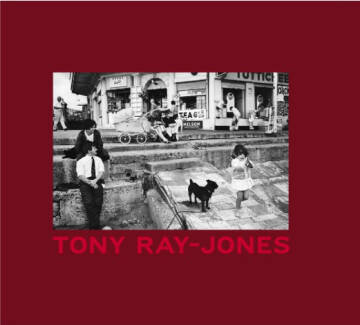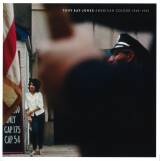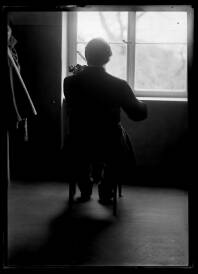Tony Ray-Jones
by Tony Ray-Jones
Photographs: Tony Ray-Jones
Text: Essay by Liz Jobey, Introduction by Martin Parr
Publisher: RRB Photobooks
128 pages
Year: October 2019
Comments: Hardcover, Red Cloth, 30 x 25 cm
This new book from RRB Photobooks and the Martin Parr Foundation will mark the important contribution that Tony Ray-Jones (1941 – 1972) and his legacy, have made to British documentary photography.
The exhibition and book will focus on photographs taken between 1966 – 1969 as Ray-Jones, driven by curiosity, travelled across the country to document English social customs and what he saw as a disappearing way of life. This small but distinctive body of photographs was part of an evolutionary shift in British photography, placing artistic vision above commercial success. In this short period of time, Ray-Jones managed to establish an individual personal style. He constructed complex images against a uniquely English backdrop, where the spaces between the components of the image were as important as the main subject matter itself.
‘I have tried to show the sadness and humour in a gentle madness that prevails in people. The situations are sometimes ambiguous and unreal, and the juxtapositions of elements seemingly unrelated, and yet the people are real. This, I hope, helps to create a feeling of fantasy. Photography can be a mirror and reflect life as it is, but I also think that perhaps it is possible to walk, like Alice, through the looking glass, and find another kind of world with the camera.’
Ray-Jones’ skills were gleaned from a generation of street photographers he encountered whilst living in New York in the mid-1960s. These photographers included Garry Winogrand, Joel Meyerowitz and others associated with the circle of legendary Harpers Bazaar art director Alexey Brodovitch. Their pictures defined the era as they used the street as a framework. Ray-Jones applied this new way of seeing to his native England and photographed his observations as they had never been seen before.
In 2012, Martin Parr alongside curator Greg Hobson, revisited Ray-Jones' contact sheets from this period and found previously unseen images. These new discoveries will be exhibited and published alongside iconic early images, including vintage prints from the Martin Parr Foundation collection.
Tony Ray-Jones (1941 – 1971) was born in Wells, Somerset and studied graphic design at the London School of Printing. In 1960, aged just 19, Ray-Jones won a two-year scholarship to Yale in the Untied States. Following a chance meeting with Alexey Brodovitch, he attended his classes at the Design Laboratory in New York alongside fellow students including Robert Frank, Irving Penn and Garry Winogrand. He returned to England in 1966 and whilst supporting himself through photographic assignments, he travelled around the country in a VW camper van. His work was exhibited at the ICA, London in 1969 alongside that of Dorothy Bohm, Don McCullin and Enzo Ragazzini. In 1971 he returned to the United States to take up a teaching post at the San Francisco Art Institute and began planning future projects before being diagnosed with Leukemia in 1972. He returned to the UK for treatment and died aged just 31. The first monograph of his work, A Day Off (1974) was published posthumously and a retrospective of his work was held at the National Media Museum in 2004. In 2013, Media Space at the Science Museum, London displayed his work alongside that of Martin Parr in the touring exhibition Only in England.
More books by Tony Ray-Jones
more books tagged »British« | >> see all
more books tagged »black and white« | >> see all
-
RATIO
by Bram Van Stappen
Euro 60 -
I walk toward the sun which is always going down
by Alan Huck
sold out -
FAMILY / KAZOKU
by Masahisa Fukase
Euro 55 -
Cycl'es
by Ilkka Uimonen
Euro 45 -
Berlin Mai 1945
by Valery Faminsky
Euro 52 -
SOHO
by Anders Petersen
Euro 185
Random selection from the Virtual bookshelf josefchladek.com
Tony Ray-Jones
by Tony Ray-Jones
Photographs: Tony Ray-Jones
Text: Essay by Liz Jobey, Introduction by Martin Parr
Publisher: RRB Photobooks
128 pages
Year: October 2019
Comments: Hardcover, Red Cloth, 30 x 25 cm
This new book from RRB Photobooks and the Martin Parr Foundation will mark the important contribution that Tony Ray-Jones (1941 – 1972) and his legacy, have made to British documentary photography.
The exhibition and book will focus on photographs taken between 1966 – 1969 as Ray-Jones, driven by curiosity, travelled across the country to document English social customs and what he saw as a disappearing way of life. This small but distinctive body of photographs was part of an evolutionary shift in British photography, placing artistic vision above commercial success. In this short period of time, Ray-Jones managed to establish an individual personal style. He constructed complex images against a uniquely English backdrop, where the spaces between the components of the image were as important as the main subject matter itself.
‘I have tried to show the sadness and humour in a gentle madness that prevails in people. The situations are sometimes ambiguous and unreal, and the juxtapositions of elements seemingly unrelated, and yet the people are real. This, I hope, helps to create a feeling of fantasy. Photography can be a mirror and reflect life as it is, but I also think that perhaps it is possible to walk, like Alice, through the looking glass, and find another kind of world with the camera.’
Ray-Jones’ skills were gleaned from a generation of street photographers he encountered whilst living in New York in the mid-1960s. These photographers included Garry Winogrand, Joel Meyerowitz and others associated with the circle of legendary Harpers Bazaar art director Alexey Brodovitch. Their pictures defined the era as they used the street as a framework. Ray-Jones applied this new way of seeing to his native England and photographed his observations as they had never been seen before.
In 2012, Martin Parr alongside curator Greg Hobson, revisited Ray-Jones' contact sheets from this period and found previously unseen images. These new discoveries will be exhibited and published alongside iconic early images, including vintage prints from the Martin Parr Foundation collection.
Tony Ray-Jones (1941 – 1971) was born in Wells, Somerset and studied graphic design at the London School of Printing. In 1960, aged just 19, Ray-Jones won a two-year scholarship to Yale in the Untied States. Following a chance meeting with Alexey Brodovitch, he attended his classes at the Design Laboratory in New York alongside fellow students including Robert Frank, Irving Penn and Garry Winogrand. He returned to England in 1966 and whilst supporting himself through photographic assignments, he travelled around the country in a VW camper van. His work was exhibited at the ICA, London in 1969 alongside that of Dorothy Bohm, Don McCullin and Enzo Ragazzini. In 1971 he returned to the United States to take up a teaching post at the San Francisco Art Institute and began planning future projects before being diagnosed with Leukemia in 1972. He returned to the UK for treatment and died aged just 31. The first monograph of his work, A Day Off (1974) was published posthumously and a retrospective of his work was held at the National Media Museum in 2004. In 2013, Media Space at the Science Museum, London displayed his work alongside that of Martin Parr in the touring exhibition Only in England.
More books by Tony Ray-Jones
more books tagged »British« | >> see all
more books tagged »black and white« | >> see all
-
RATIO
by Bram Van Stappen
Euro 60 -
I walk toward the sun which is always going down
by Alan Huck
sold out -
FAMILY / KAZOKU
by Masahisa Fukase
Euro 55 -
Cycl'es
by Ilkka Uimonen
Euro 45 -
Berlin Mai 1945
by Valery Faminsky
Euro 52 -
SOHO
by Anders Petersen
Euro 185
Random selection from the Virtual bookshelf josefchladek.com
Tony Ray-Jones
by Tony Ray-Jones
Photographs: Tony Ray-Jones
Text: Essay by Liz Jobey, Introduction by Martin Parr
Publisher: RRB Photobooks
128 pages
Year: October 2019
Comments: Hardcover, Red Cloth, 30 x 25 cm
This new book from RRB Photobooks and the Martin Parr Foundation will mark the important contribution that Tony Ray-Jones (1941 – 1972) and his legacy, have made to British documentary photography.
The exhibition and book will focus on photographs taken between 1966 – 1969 as Ray-Jones, driven by curiosity, travelled across the country to document English social customs and what he saw as a disappearing way of life. This small but distinctive body of photographs was part of an evolutionary shift in British photography, placing artistic vision above commercial success. In this short period of time, Ray-Jones managed to establish an individual personal style. He constructed complex images against a uniquely English backdrop, where the spaces between the components of the image were as important as the main subject matter itself.
‘I have tried to show the sadness and humour in a gentle madness that prevails in people. The situations are sometimes ambiguous and unreal, and the juxtapositions of elements seemingly unrelated, and yet the people are real. This, I hope, helps to create a feeling of fantasy. Photography can be a mirror and reflect life as it is, but I also think that perhaps it is possible to walk, like Alice, through the looking glass, and find another kind of world with the camera.’
Ray-Jones’ skills were gleaned from a generation of street photographers he encountered whilst living in New York in the mid-1960s. These photographers included Garry Winogrand, Joel Meyerowitz and others associated with the circle of legendary Harpers Bazaar art director Alexey Brodovitch. Their pictures defined the era as they used the street as a framework. Ray-Jones applied this new way of seeing to his native England and photographed his observations as they had never been seen before.
In 2012, Martin Parr alongside curator Greg Hobson, revisited Ray-Jones' contact sheets from this period and found previously unseen images. These new discoveries will be exhibited and published alongside iconic early images, including vintage prints from the Martin Parr Foundation collection.
Tony Ray-Jones (1941 – 1971) was born in Wells, Somerset and studied graphic design at the London School of Printing. In 1960, aged just 19, Ray-Jones won a two-year scholarship to Yale in the Untied States. Following a chance meeting with Alexey Brodovitch, he attended his classes at the Design Laboratory in New York alongside fellow students including Robert Frank, Irving Penn and Garry Winogrand. He returned to England in 1966 and whilst supporting himself through photographic assignments, he travelled around the country in a VW camper van. His work was exhibited at the ICA, London in 1969 alongside that of Dorothy Bohm, Don McCullin and Enzo Ragazzini. In 1971 he returned to the United States to take up a teaching post at the San Francisco Art Institute and began planning future projects before being diagnosed with Leukemia in 1972. He returned to the UK for treatment and died aged just 31. The first monograph of his work, A Day Off (1974) was published posthumously and a retrospective of his work was held at the National Media Museum in 2004. In 2013, Media Space at the Science Museum, London displayed his work alongside that of Martin Parr in the touring exhibition Only in England.
More books by Tony Ray-Jones
more books tagged »British« | >> see all
more books tagged »black and white« | >> see all
-
RATIO
by Bram Van Stappen
Euro 60 -
I walk toward the sun which is always going down
by Alan Huck
sold out -
FAMILY / KAZOKU
by Masahisa Fukase
Euro 55 -
Cycl'es
by Ilkka Uimonen
Euro 45 -
Berlin Mai 1945
by Valery Faminsky
Euro 52 -
SOHO
by Anders Petersen
Euro 185
Random selection from the Virtual bookshelf josefchladek.com





























;jpg?c=361159da982555a0c11115757e2fd6ff)





;jpg?c=4ba66f72c3d0b62c9a25fa6d29f38b65)
